新概念英语第一册75-76课
(完整版)新概念英语第一册第75-76课-Uncomfortableshoes
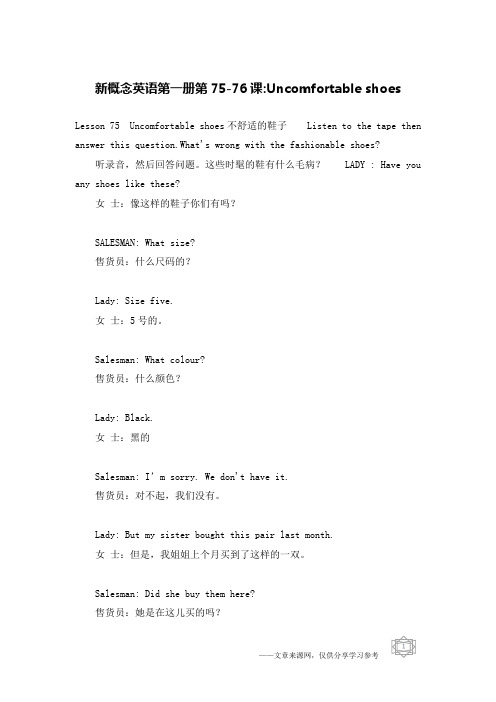
新概念英语第一册第75-76课:Uncomfortable shoesLesson 75 Uncomfortable shoes不舒适的鞋子Listen to the tape then answer this question.What's wrong with the fashionable shoes?听录音,然后回答问题。
这些时髦的鞋有什么毛病?LADY : Have you any shoes like these?女士:像这样的鞋子你们有吗?SALESMAN: What size?售货员:什么尺码的?Lady: Size five.女士:5号的。
Salesman: What colour?售货员:什么颜色?Lady: Black.女士:黑的Salesman: I’m sorry. We don't have it.售货员:对不起,我们没有。
Lady: But my sister bought this pair last month.女士:但是,我姐姐上个月买到了这样的一双。
Salesman: Did she buy them here?售货员:她是在这儿买的吗?Lady: No, she bought them in the U.S.女士:不。
她是在美国买的。
Salesman: We had some shoes like those a month ago, but we haven’t any now.售货员:一个月前我们有这样的鞋。
但是现在没有了。
Lady: Can you get a pair for me please?女士:您能为我找一双吗?Salesman: I’m afraid that I can’t. They were in fashion last year and the year before last.But they’re not in fashion this year.售货员:恐怕不行。
新概念英语第一册+Lesson+75-76课件

When did Xiaoxin go to Beijing?
5.the day before yesterday,
the week before last..
Can you give some words or short sentences?
1.你昨晚上去哪了?
yesterday
Where did you go___________?
2.我上周考试了。
last week
When + did +主语 + V原 + 其他?
Practice
1.I took those pictures a month ago.(对画线部分提问)
When did you take those pictures?
2.We walked across the garden half an hour ago.(对画
✅
When did Meiya buy the new shorts?
She bought it two days ago.
What did Xiaoxin do?
What did Xiaoxin do?
He wore the new shorts.
Can you remember ?
When did Meiya buy the new pair of shorts?
1.直接加ed
2.e 结尾直接加d
3.辅音加y 结尾 ied
元音加y 结尾 加ed
4. cvc 结构 双写加ed
Xiao xin’s family join the show.
Today is July 20th.
新概念英语第一册Lesson75-76(课堂PPT)
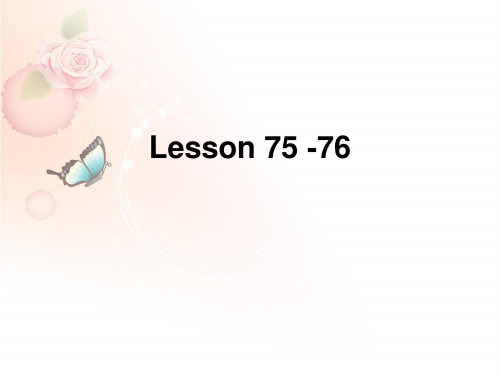
1
New words and expressions
ago adv. 以前
eg: a week ago
buy(bought) v. 买 sell v. 卖
pair n. 双,对 eg:a pair of shoes
组合造句
wear(wore) v. 穿着
fashion n. (服装的)流行式样 eg: be
put on 表穿上的动作/be dressed in 侧重打扮 的意味/have…. on 表状态 /in+color 表状态
• Please put on your coat. • The lady is dressed in a blue coat and a
large hat. • The emperor has nothing on. • a girl in white
• She meets her friends every day. • She met her friends yesterday. • They drink some milk every. • They drank some milk yesterday. • He swims in the river every day. • He swam in the river yesterday. • She takes him to school every day. • She took him to school yesterday. • He cuts himself every morning. • He cut himself yesterday morning. 9
Exercises B
• walk across the park/last week
新概念英语第一册第75-76课:Uncomfortable shoes
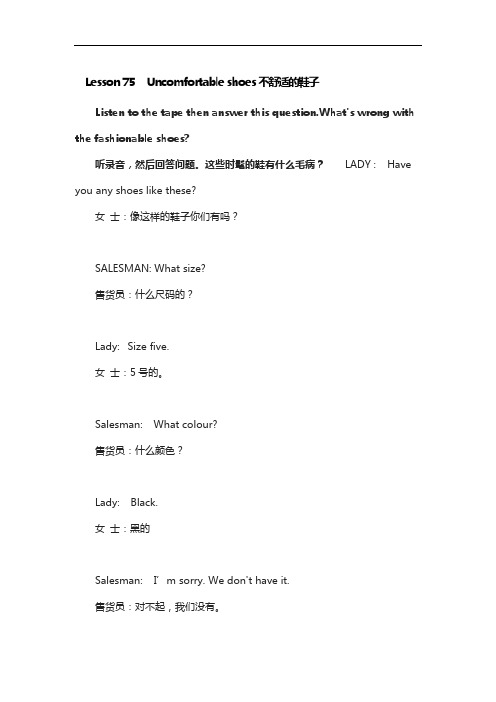
Lesson 75 Uncomfortable shoes不舒适的鞋子Listen to the tape then answer this question.What's wrong with the fashionable shoes?听录音,然后回答问题。
这些时髦的鞋有什么毛病?LADY : Have you any shoes like these?女士:像这样的鞋子你们有吗?SALESMAN: What size?售货员:什么尺码的?Lady: Size five.女士:5号的。
Salesman: What colour?售货员:什么颜色?Lady: Black.女士:黑的Salesman: I’m sorry. We don't have it.售货员:对不起,我们没有。
Lady: But my sister bought this pair last month.女士:但是,我姐姐上个月买到了这样的一双。
Salesman: Did she buy them here?售货员:她是在这儿买的吗?Lady: No, she bought them in the U.S.女士:不。
她是在美国买的。
Salesman: We had some shoes like those a month ago, but we haven’t any now.售货员:一个月前我们有这样的鞋。
但是现在没有了。
Lady: Can you get a pair for me please?女士:您能为我找一双吗?Salesman: I’m afraid that I can’t. They were in fashion last year and the year before last.But they’re not in fashion this year.售货员:恐怕不行。
这鞋在去年和前年时兴,而今年已不流行了。
新概念英语第一册lesson75-76教学教材

a bottle of wine a hand of bananas
fashion n. (服装的)流行式样 • be in fashion ……是流行的 • 今年流行这种颜色
This color is in fashion this year. • be 定句
What size do you wear ?
你穿几码的?
一般过去时与时间短语
一般过去时通常与表示确切的过去时间的短 语连用。这些短 语一般是last +表不时间的 名词、一段时间+ ago等。
(1)last week/month/year/night(上星期 /上个 月 /去年 /昨夜):
e.g. Did you zvatck the television last night ? 你昨晚看电视了吗?
一点算起
• I went to London three days ago. • She left 30 minutes ago. • Long long ago, there lived a king. • 很久很久以前,这里住着一位国王。
• Before I arrived at the station yesterday, the train had already left.
• 他每天都戴领带。 He wears a tie every day.
• 这位女士穿着一件很漂亮的裙子。 The lady is wearing a beautiful dress. put on穿/戴(动作) Just now, he hurriedly put on his coat and now he is wearing the white coat.
pair n. 双,对 • 一副手套是件好礼物
新概念英语第一册第75-76课课件
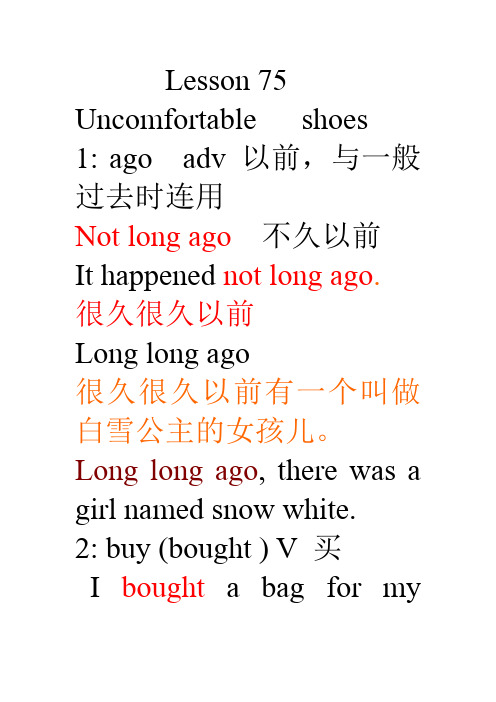
Lesson 75 Uncomfortable shoes 1: ago adv 以前,与一般过去时连用Not long ago不久以前It happened not long ago.很久很久以前Long long ago很久很久以前有一个叫做白雪公主的女孩儿。
Long long ago, there was a girl named snow white.2: buy (bought ) V 买I bought a bag for mysister.My father bought a second-hand car.Buyer n 购买者Sell (sold) V 卖Sell sth at a high price.高价出售。
I sold my mp3 to a friend. Seller n 卖方,售出之物This dictionary is a best seller.3: pair n 双,对后接复数名词a pair of shoes.a pair of gloves.a pair of socks.a pair of ear-rings.4: fashion n 服装的流行式样Dressed in the latest fashion.A fashion show. 时装表演。
Fashion magazine 时装杂志Come into fashion 流行Go out of fashion 过时的Fashionable adj 时髦的It is Fashionable to have short hair today.6: uncomfortable adj 不舒服的。
Uncomfortable chairs Uncomfortable shoes Uncomfortable rooms Comfortable adj 舒服的7:wear V 穿着,戴着,She never wears green.NMen’s wear男装Sport wear运动装Context:1:Like 像…..Eg: How can you treat yourparents like this?2:size five 名词在前数词在后Lesson tenRoom 102Class 6No. 1023:I’m afraid 我恐怕I’m afraid you can’t go with me.4: last yearThe year before lastThe day before yeaterday. 5: be in fashion now现在正流行。
新概念第一册75课--76课
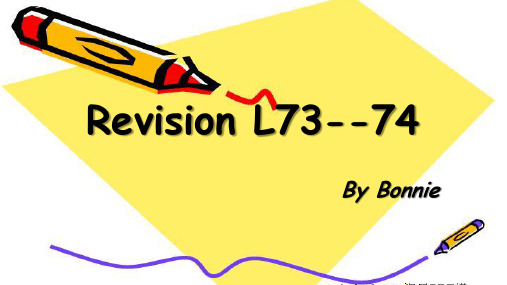
一般过去时
肯定句 He walked _______(walk) across the park an hour gao. 否定句 He_______________(walk) across the didn't walk park an hour ago.
3.They enjoyed themselves now.
4.Did you went to school yesterday? 5.Did you bought the shirt last night?
• handbag • housewife • homework
• housework
• ...
Conclusion:时间状语后置。(即放在句末)
一般现在时
肯定句
He _______(walk) across the park. walks
否定句
doesn't walk He_______________(walk) across the
park.
一般疑问句
_____ the park? Does he ______(walk)across walk
Lesson 76 When did you ...?
last week the week before last last year the year before last a minute ago an hour ago 4 months ago 6 years ago 1.She asked a question a minute ago. 2.They talked to the salesman an hour ago. 3.He worked in an office last week. 4.I looked at a photograph 4 months ago.
新概念第一册参考答案(Lessons 75-76)

新概念第一册参考答案(Lessons 75-76)新概念英语第一册第75-76课词汇学习 Word studywear v.(1)穿着;戴着;佩带着:But women always wear uncomfortable shoes! 不过女人们总是穿不舒适的鞋子!Look at the beautiful silk scarf she's wearing! 瞧她围着的那条漂亮的丝绸围巾!She never wears perfume. 她从不用香水。
(2)面带;表现;保持:He's wearing a cheerful smile. 他面带着快活的微笑。
He wears his dignity even in great adversity. 他即使身处逆境也仍保持着自己的尊严。
uncomfortable adj.(1)不舒服的:She feels uncomfortable in tight boots. 她穿着紧的长统靴感到不舒服。
(2)不安的;不自在的:You'll have an uncomfortable feeling if you sit there alone. 如果你独自一人坐在那儿,你会有种不安的感觉。
He often feels uncomfortable with strangers. 与陌生人在一起他通常感到不自在。
(3)令人不舒服的,不舒适的:This pair of shoes look very uncomfortable. 这双鞋看上去很不舒适。
It's really an uncomfortable day! 这真是令人难受的一天!新概念英语第一册第76课练习答案 Key to written exercisesLesson 76A1 She met her friends yesterday.2 They drank some milk yesterday.3 He swam in the river yesterday.4 She took him to school yesterday.5 He cut himself yesterday(morning).B1 When did you walk across the park?I walked across the park last week.2 When did you wash your hands?I washed my hands a minute ago.3 When did you work in an office?I worked in an office the year before last.4 When did you ask a question?I asked a question five minutes ago.5 When did you type those letters?I typed those letters a month ago.6 When did you watch television?I watched television every day this week.7 When did you talk to the shop assistant?I talked to the shop assistant last month.8 When did you thank your father?I thanked my father an hour ago.9 When did you dust the cupboard?I dusted the cupboard three days ago.10 When did you paint that bookcase?I painted that bookcase the year before last.11 When did you want a car like that one?I wanted a car like that one a year ago.12 When did you greet her?I greeted her a minute ago.。
新概念第一册参考答案(Lessons 75-76)

新概念第一册参考答案(Lessons 75-76)新概念英语第一册第75-76课词汇学习 Word studywear v.(1)穿着;戴着;佩带着:But women always wear uncomfortable shoes! 可是女人们总是穿不舒适的鞋子!Look at the beautiful silk scarf she's wearing! 瞧她围着的那条漂亮的丝绸围巾!She never wears perfume. 她从不用香水。
(2)面带;呈现;保持:He's wearing a cheerful smile. 他面带着快活的微笑。
He wears his dignity even in great adversity. 他即使身处逆境也仍保持着自己的尊严。
uncomfortable adj.(1)不舒服的:She feels uncomfortable in tight boots. 她穿着紧的长统靴感到不舒服。
(2)不安的;不自在的:You'll have an uncomfortable feeling if you sit there alone. 如果你独自一人坐在那儿,你会有种不安的感觉。
He often feels uncomfortable with strangers. 与陌生人在一起他通常感到不自在。
(3)令人不舒服的,不舒适的:This pair of shoes look very uncomfortable. 这双鞋看上去很不舒适。
It's really an uncomfortable day! 这真是令人难受的一天!新概念英语第一册第76课练习答案 Key to written exercises Lesson 76A1 She met her friends yesterday.2 They drank some milk yesterday.3 He swam in the river yesterday.4 She took him to school yesterday.5 He cut himself yesterday(morning).B1 When did you walk across the park?I walked across the park last week.2 When did you wash your hands?I washed my hands a minute ago.3 When did you work in an office?I worked in an office the year before last.4 When did you ask a question?I asked a question five minutes ago.5 When did you type those letters?I typed those letters a month ago.6 When did you watch television?I watched television every day this week.7 When did you talk to the shop assistant?I talked to the shop assistant last month.8 When did you thank your father?I thanked my father an hour ago.9 When did you dust the cupboard?I dusted the cupboard three days ago.10 When did you paint that bookcase?I painted that bookcase the year before last.11 When did you want a car like that one?I wanted a car like that one a year ago.12 When did you greet her?I greeted her a minute ago.。
新概念英语NCE1_lesson75-76(共36页)课件

• 前半句话是一般过去时(...ago),后半句话是一 般现在时(now)。
• 前半句话是肯定句(some),后半句话是否定 句(any)。
• 举例:Long long ago, there lived a monk.... 很久很 久以前,有一个和尚。。。
8、Can you get a pair for me, please?
• 这里的them代指the shoes pair here?
• 6、No, she bought them in the U.S. 省略句。
• 补全:No, she didn’t buy them here. She bought them in the U.S.
• get本义是得到、获得,在这里是取、拿的意思 (口语)。
• 前半句话是一般过去时(...ago),后半句话是一般现在时 (now)。
• 前半句话是肯定句(some),后半句话是否定句 (any)。
• 举例:Long long ago, there lived a monk.... 很久很久以前, 有一个和尚。。。
• 7、We had some shoes like those a month ago, but we don’t have any (shoes like those) now.
Lesson 75 Uncomfortable shoes
不舒适的鞋子
1. ago adv. 以前
• ago 用于一般过去时; long ago很久以前 long long ago 很久很久以前 not long ago 不久之前
• three days ago • 我三天前去的伦敦。
I went to London three days ago.
新概念英语第一册第75-76课课件
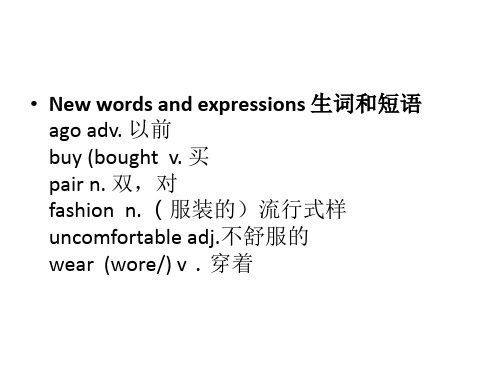
• • • • • • • • • • • •
Exercises: I. Write the past tense form of the verbs. 1. wear _______ 2. swim ________ 3. want _______ 4. have ________ 5. say ________ 6. greet________ 7. cut_________ 8. buy _________ 9. teach ______ 10. stant________ 11.get ________ 12. know ________ 13.take________ 14. meet ________ 15.read________ 16. understand _______ 17.drive_______ 18. answer ________ 19.tell _______ 20. lost__________
• • • • •
sell 卖 retail 零售 purchase 正式的购买,大宗购物 market n. 市场,v. 销售 marketing manager 市场经理、销售经理
• • • • • •流行式样 They were in fashion last year and the year before last. 这些在去年和前年时兴。 Her dress is the latest fashion this year. 她的裙子是今年的最新款式。 What hat is in fashion now? 现在流行哪种帽子? fashion n. (服装的)流行式样 fashionable 时尚 be in fashion 是流行的 They are not in fashion this year. be out of fashion 不流行 smart 巧妙,时髦
新概念英语第一册Lesson 75-76
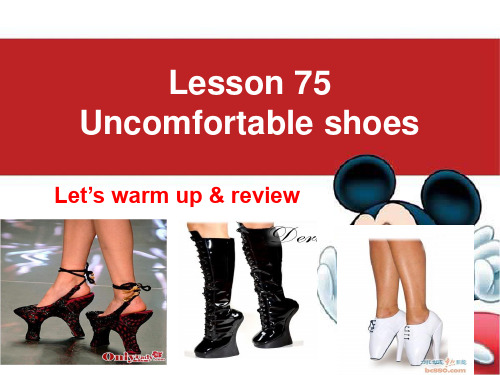
① v. 穿着;戴着;佩带着 她从不用香水。 She never wears perfume.
② v. 面带;呈现;保持 他面带欢快的笑容 He’s wearing a cheerful smile. He wears his dignity even in great adversity. 他即使身处逆境也仍保持着自己的尊严。
Let’s give a play .
Lesson 75 Uncomfortable shoes
一般过去时
定义:表示过去某个时间发生的动作或存在的状 态。
1.基本结构:主语+ 动词过去式did +其他;
2.否定形式:①主语+was/were not+ 其他;
②主语+didn‘t
动词原形do + 其他;
★fashion n. (服装的)流行式样 be in fashion ……是流行的 今年流行这种颜色 This color is in fashion this year. be out of fashion 不流行
★uncomfortable adj. 不舒服的 ① adj. 不舒服的 她穿紧身的靴子觉得不舒服。 She feels uncomfortable in tight boots. ② adj. 不安的;不自在的 如果你自己坐在那就会有不自在的感觉。 You’ll have an uncomfortable feeling if you sit there alone. 他和陌生人在一起时经常觉得不安。 He often feels uncomfortable with strangers. ③ adj. 令人不舒服的,不舒适的 这双鞋看起来不舒适。 This pair of shoes look very uncomfortable.
新概念英语第一册 Lesson75-76 (共30张PPT)

Text: Uncomfortable shoes
Salesman: Lady: Salesman:
Lady: Salesman:
Did she buy them here? No, she bought them in the U.S.
We had some shoes like those a month ago, but we haven’t any now. Can you get a pair for me please? I’m afraid that I can’t. They were in fashion last year and the year before last. But they’re not in fashion this year.
Vocabulary
幼 儿 园 万 圣 节活动 实施方 案
Halloween Activity Project 活 动 日 期 :October. 13 ~ October 31 活 动 目 标 :透 过Halloween节 庆 气 氛 的引 导,让孩 子感染 跨国文 化的异 同处并藉由活 动 并 制 造 机 会让孩 子可以 适时的 尽情调 皮捣蛋 。
e.g. 这双鞋子已经过时了,我喜欢 那一双,那双很时尚。
The pair of shoes is out of fashion. I like that one. That one is in fashion.
Vocabulary
(5) uncomfortable adj. 不舒服的
e.g. 她穿着紧的长统靴感到不舒服。 She _f_ee_l_s_u_n_c_o_m_f_or_t_a_b_le______in tight boots.
新概念英语第一册lesson75-76教学教材-2022年学习资料
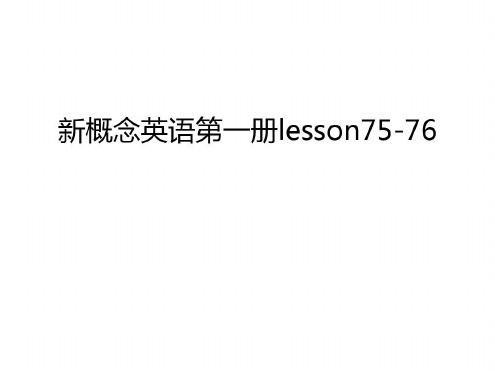
What size?什么尺码的?-这是一个省略句,后面省略do you want。.下文中-的Vhat c lour?同样也是省略句。what size.通常-用来询问服装、鞋子、手套等的尺寸,即什么号-码:-Wh t size do you wear-你穿几码的?
般过去时与时间短语-般过去时通常与表示确切的过去时间的短-语连用。这些短语一般是ast+表不时间的-名词、 段时间+ago等-c-1last week/month/year/night上星期/上个-月/去年昨夜:.g.Did you zvatck the television last night-你昨晚看电视了吗? 2two-minutes/hours/days/weeks/months/years ago-两分钟/小时 天/周/月/年前:-e.g.She bought the shoes tvuo months ago.-她 个月之前买的这双鞋。
பைடு நூலகம்
·3in+过去某一年:-e.g.We first met him in 1980.-我们1980年初次见到 。-4yesterday昨天,yesterday evening昨天晚上-,the week before last前一k个星期,the month-before last前一个月,the year before ast前年,-the day before yesterday前天,the night before-la t前天夜里:-e.g.She dusted the cupboard the day before yes erday.-她前天清扫了橱柜。
Do you have any-]shoe的适当形式like these?-But my sister☐t uy的适当形式this pair last-由nonth.-:Did she buy☐-they的适当形式 ere?-:No,shebbuy的适当形式them in the U.S.-:We□have的适当形式so e shoes like those a-month ago,but we don't have☐some 适当形式-now.-Can you get a pair for☐(的适当形式),please?-.I'm afraid that I can't.-They☐be的适当形式in fashion last year and the-year before last.-But they're not in fashion his year.-:☐this的复数形式shoes are in fashion now.-They l ok very uncomfortable.-They are very uncomfortable.-B
新概念第一册Lesson75-76PPT课件

• 我妹妹每周都买一件新裙子。 My sister buys a new dress every
week. • 我上周在巴黎买了一件外套。
I bought a coat in Paris last month. • sell 卖 • market n. 市场 v. 销售 • marketing manager 市场经理、销售经理
把上面句子变成否定句
=be in style
第16页/共69页
7/23/2021
第17页/共69页
7/23/2021
flat heels
第18页/共69页
unble
7/23/2021
They are very umcomfortable.
第19页/共69页
uncomfortable [ʌn’kʌmftəbəl] 不舒服的
第11页/共69页
pair n. 双,对
a pair of gloves is a nice present
一副手套是件好礼物
I have only one pair of hands
我只有一双手 (忙不过来)
第12页/共69页
a pair of glasses 一副眼镜 a pair of shoes一双鞋子 a pair of jeans一条牛仔裤 a pair of trousers一条裤子 a pair of chopsticks 一双筷子
I’m sorry. We don’t have any.
But
my sister Did she
bbobuuuyghttthheims phaeirrela?st
新概念英语第一册75-76课

A 4. He doesn’t know me very _____.
A. well B. welly C. good D. goodly
be Were we…?
Were you…? Were they…?
Yes,we/you were. Yes,we were. Yes,they were.
No,we/you were No,we were No,they were not.
not.
not.
Did I work? Yes,you did. No,you did not.
进入下页 返回首页
一般过去时态句式的构成
疑问句式
动词
疑问句式和简略答语
第一人称
第二人称
第三人称
Was I …?
Were you…? Was he/she/it…?
Yes, you were. Yes,I was. Yes,he/she/it was.
No, you were not. No,I was not. No,he/she/it was not.
一般现在时
• We are doing our housework now.
•
正在
• The bus is leaving at 8:00.
进行
•
时
•
be动词(was,were)
•助动词(did) Nhomakorabea主语+谓语 •
•
情态动词(could,might) 实义动词(有确切含义的动词,可
新概念英语第一册-Lesson75-76

拓展: buy的反义词:sell v.卖 sold-sold sell sb sth=sell sth to sb for+money 以…钱卖给某人某物 He sold his brother his car for 10,000 yuan =He sold his car to his brother for 10,000 yuan 他以10000块把他的车卖给了他的 哥哥。
Like father, like son 有其父,必有其子.
12
2. What size?=What size (do you want)? (省略句)用来询问服装,鞋子,手套等 的尺寸
• size: Small Medium Large • Extra Large • What colour?=what color do you want? • 省略句
any
26
• 一般的动词后面直接加-ed,
• 如:cook—cooked
• wash--washed
① 清辅音后面加ed,读[t]
asked
② 浊辅音或元音后面加ed,读[d] cleaned
③ d/t +ed [id]
dusted
27
一小时前
When did you look at that photograph? I looked at that photograph an hour ago.
13
buy [bai] v. 买 bought--bought
我每周都买一本新书。 I buy a new book every week.
我妹妹每周都买一件新裙子。 My sister buys a new dress every
新概念英语第一册75-76课PPT课件

eg. - Did you go shopping yesterday?
When and where were you born?
-
16
5、谓语变化
-
17
规则动词过去式的构成
构成规则
例词
1. 一般在动词原形末尾加-ed
2. 结尾是 e 的动词加 -d
3. 末尾只有一个辅音字母的重读 闭音节词,先双写这个辅音字 母,再加-ed
morning
yesterday afternoon
evening
the day befo-re yesterday 6
4.与one 连用: morning
one
evening day
Monday afternoon
5.与that 连用:
that
morning winter day year
-
7
6.其他时间状语:
look play start live hope use
stop plan trip
looked played started lived hoped used
stopped planned tripped
4. 结尾是“辅音字母+y”的动词, study studied
先变“y”为“i”再加-ed
just now
in the old days in those days
in 1980
the other day
at that time
once upon a time
-
8
3、一般过去时的构成
-
9
所有时态都是通过动词变化来表现的
• E.g. • You are right. • • I want to go to school.
- 1、下载文档前请自行甄别文档内容的完整性,平台不提供额外的编辑、内容补充、找答案等附加服务。
- 2、"仅部分预览"的文档,不可在线预览部分如存在完整性等问题,可反馈申请退款(可完整预览的文档不适用该条件!)。
- 3、如文档侵犯您的权益,请联系客服反馈,我们会尽快为您处理(人工客服工作时间:9:00-18:30)。
2、一般过去时的判断标志: 明确的过去时间状语
1.与ago 连用: a moment two minutes three hours five days one week six months four years
ago
2.与last 连用
time night
last
week month
term
6.其他时间状语:
just now in the old days in those days in 1980 the other day at that time once upon a time
3、一般过去时的构成
所有时态都是通过动词变化来表现的
• E.g. • You are right. • • I want to go to school.
I/You/He/She/It/We/You/They did not(didn’t) work. There was not (wasn’t) …. There were not (weren’t)….
进入下页 返回首页
一般过去人称
Was I …? Yes, you were. No, you were not. Were we…? Yes,we/you were. No,we/you were not.
Did you work? Yes,I did. No, I did not.
单项选择
D 1. He doesn’t know the way _____ London.
A. in B. on C. for D. to C 2. I often say _____ myself “I should study
English well.” A. in B. for C. to D. on
•
等)
例如:
• They were happy.
• He played football.
• You did your homework.
4、一般过去时句式变换
一般过去时态句式的构成
陈述句式
动词 be
肯定式 I was …. He /She/it was…. We/You/They were ….
一般现在时
• We are doing our housework now.
•
正在
• The bus is leaving at 8:00.
进行
•
时
• • 主语+谓语
be动词(was,were) 助动词(did)
情态动词(could,might)
•
实义动词(有确切含义的动词,可
•
以单独做谓语,如:played
My father was at work yesterday afternoon
(用法二) 也表示过去经常或反复发生的动作,常和表示频度的时间状语 连用。
例句: He always went to work by bus last year. (含有频度副词: often always 等,但主要还是含有过去时间状语)
3.与yesterday 连用:
Monday
yesterday
morning afternoon
evening
the day before yesterday
4.与one 连用:
one
morning evening day Monday afternoon
5.与that 连用:
that
morning winter day year
否定式 I was not(wasn’t)…. He/She/It was not(wasn’t)…. We/You/They were not (weren’t)…
I/You/He/She/It/We/ work
You/They worked.
There was …. there be There were….
A 3. Look! He is walking _____ in the street. A. slowly B. slow C. careful D. lazy
A 4. He doesn’t know me very _____.
A. well B. welly C. good D. goodly
D 5.---Where _____ you last Sunday? ---I _____ in New York. A.was, was B. were, were C. was, were D. were, was
c 6. Yesterday the little boy _____ his way.
work
there be
Did I work? Yes,you did. No,you did not. Did we work? Yes,we/you did. No,we/you did not. Was there a/ any…? Yes,there was. No,there was not.
A. for B. at C. in D. on
一般过去时
1、 时态介绍 2、判断标志 3、一般过去时构成 4、 一般过去时的句式变化 5、谓语变化 6、练习
1.定义: (用法一) 一般过去时态表示过去某个时间发生的动作或存在的状态,常
和表示过去的时间状语连用; 例句:I got up at 7:00 yesterday.
疑问句式和简略答语
第二人称
Were you…? Yes,I was. No,I was not.
第三人称
Was he/she/it…? Yes,he/she/it was. No,he/she/it was not.
Were you…? Yes,we were. No,we were not.
Were they…? Yes,they were. No,they were not.
A. lose B. loses C. lost D. losing B 7. We enjoyed ______ yesterday evening.
A. ourself B. ourselves C. us D. ourselfs B 8. She waited _____ the bus stop two hours ago.
